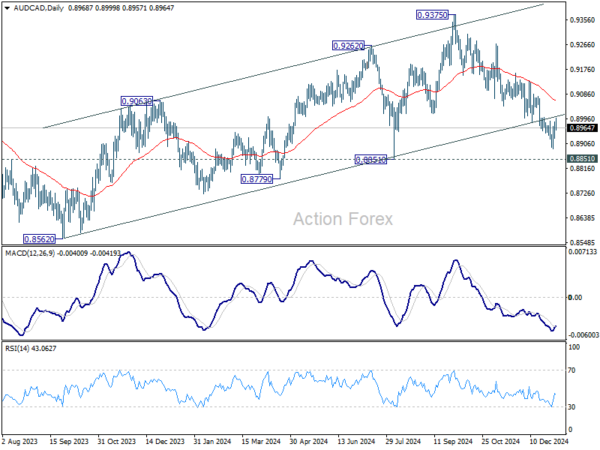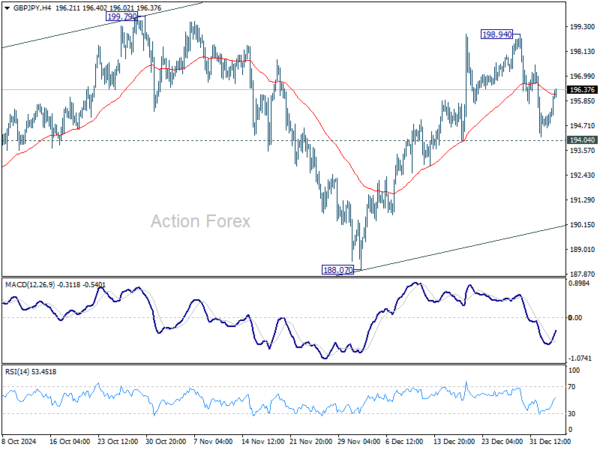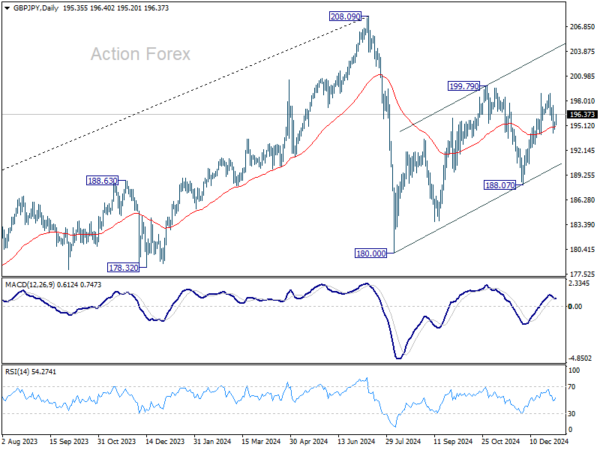Yen Weakens Despite Risk-Off Sentiment,Jobs And Inflation Data To Drive Markets Ahead

Yen struggles today even as risk aversion set the tone across Asian markets. Nikkei extended its retreat after briefly breaching 40k psychological level last week, as the rally proved unsustainable for investors. Adding to Yen’s woes, December PMI Services data highlighted only marginal growth, failing to provide a meaningful lift to the broader economy. Meanwhile, BoJ Governor Kazuo Ueda reiterated a cautious stance, offering no concrete hints about a rate hike this month. Last week’s recovery in Yen may turn out to be fleeting.
Elsewhere, commodity currencies emerge as the strongest performers today so far, extending their resilience from last week. However, their gains lack significant momentum, reflecting market caution. Meanwhile, Euro and Sterling are trading in a mixed manner, stabilizing after last week’s sharp losses. Dollar, Yen, and Swiss Franc are lagging behind, with Yen as the weakest performer.
Markets are bracing for a critical week ahead, with a slew of high-impact economic data on the docket. US Non-Farm payrolls and ISM services data will likely set the tone for the Dollar, particularly as markets remain firmly priced for Fed to pause its easing cycle this month. Inflation data from the Eurozone, Switzerland, and Australia will also attract attention, shaping the narrative around ECB, SNB, and RBA policies. Additionally, Canadian employment data will test the resilience of Loonie, which outperformed other commodity currencies last month but has recently shown signs of waning momentum.
Technically, AUD/CAD’s break of the medium term rising channel is a sign that whole corrective rally from 0.8562 has completed at 0.9375. Firm break of 0.8851 support will solidify this bearish case. However, strong bounce from current level, followed by sustained break of 55 D EMA (now at 0.9060) will keep this up trend intact. The outcome of Australia’s CPI and Canada’s employment data later this week will likely play a crucial role in determining the pair’s next significant move.
In Asia, Nikkei fell -1.47%. Hong Kong HSI is down -0.46%. China Shanghai SSE is down -0.14%. Singapore Strait Times is up 0.27%. Japan 10-year JGB yield rose 0.0357 to 1.129.
BoJ Ueda stresses caution on policy adjustments
BoJ Governor Kazuo Ueda reiterated the cautious stance on monetary policy adjustments at a Japanese Bankers Association event today. He emphasized that any interest rate hikes would depend on sustained improvements in economic and price conditions.
“Our stance is that we will raise the policy interest rate to adjust the degree of monetary easing if economic and price conditions keep improving,” Ueda stated.
However, he highlighted the need for vigilance regarding various risks, signaling that the timing of such adjustments would be carefully assessed. The governor also expressed his hopes for balanced growth in wages and prices in the coming year.
Japan’s PMI services finalized at 50.9, optimism eases
Japan’s service sector showed slight improvement in December, with final PMI Services index rising to 50.9 from 50.5 in November, indicating marginal growth. PMI Composite also increased to 50.5 from 50.1, reflecting modest stabilization in the broader economy.
Usamah Bhatti, Economist at S&P Global Market Intelligence, noted, “December data revealed sustained rises in both business activity and new business,” with new orders growing at the fastest pace in four months. Employment in the service sector rose for the fifteenth consecutive month, signaling steady labor market gains. Despite these improvements, business optimism softened slightly.
The overall economic expansion was underpinned by softer contraction in manufacturing output and ongoing growth in the service sector. New orders across sectors expanded at their fastest rate since August, supported by the completion of outstanding work, particularly in manufacturing. However, optimism regarding future output declined, falling below the 2024 average.
China’s services sector gains momentum, but Composite PMI signals broader economic strain
China’s services sector gained pace in December, with Caixin PMI Services rising to 52.2 from 51.5 in November, marking its highest level since May. However, the overall economic picture remains mixed as PMI Composite slipped to 51.4, its lowest since September. This divergence highlights that faster services growth was insufficient to offset the slowdown in manufacturing output expansion.
Wang Zhe, Senior Economist at Caixin Insight Group, remarked, “Prominent downward pressures remain, with tepid domestic demand and mounting unfavorable external factors.”
He added that sluggish employment and squeezed profit margins are weighing on market optimism. Declines in some gauges from the manufacturing PMI survey indicate that more time is needed to evaluate the consistency and effectiveness of recent policy stimulus.
Jobs and inflation: Critical data to drive first full week of 2025
As global markets enter the first full trading week of 2025, the economic calendar is packed with high-stakes events. US data, particularly Non-Farm Payrolls and ISM Services, will take center stage. Fed expectations for a pause in its easing cycle this month are solidifying, and the data is unlikely to disrupt this view unless prints are unexpectedly catastrophic. Fed minutes from December, also due this week, could offer additional context on policymakers’ risk assessments and rationales for the expected policy path.
Inflation will also be in the spotlight, with CPI releases from Eurozone, Switzerland, and Australia. Eurozone inflation is expected to rise modestly as energy base effects diminish, but this is unlikely to derail ECB’s measured pace of easing. ECB is still projected to cut rates again in January. In Switzerland, inflation should continue to hold steady stabilized at sub-1% levels, maintaining the case for SNB to proceed with further rate reductions later this year.
In Australia, the inflation picture is less clear. While the base case is still for RBA to commence rate cuts by May, steady monthly CPI readings at around 2% could bolster arguments for an earlier move in February. However, the broader outlook hinges on the upcoming quarterly inflation report due later this month.
Elsewhere, Japan’s cash earnings and household spending reports will offer insights into the domestic economy, but global uncertainties—particularly regarding US economic conditions—could push BoJ to maintain its cautious wait-and-see approach, even in the face of robust data.
Canada’s employment report will be a critical barometer for BoC’s monetary stance. BoC has signaled a slowdown in its easing pace this year, but labor market resilience—or lack thereof—will significantly influence the depth of its ongoing rate-cutting cycle.
Here are some highlights for the week:
- Monday: China Caixin PMI services; Swiss retail sales; Eurozone PMI services final, Sentix investor confidence; UK PMI services final; US PMI services final, factory orders.
- Tuesday: Japan monetary base; Australia building permits; Swiss CPI, foreign currency reserves; UK PMI construction; Eurozone CPI flash, unemployment rate; Canada trade balance, Ivey PMI; US trade balance, ISM services.
- Wednesday: Australia monthly CPI; Japan consumer confidence; Germany factory orders, retail sales; Eurozone PPI; US ADP employment, jobless claims, FOMC minutes.
- Thursday: Japan average cash earnings; Australia retail sales, goods trade balance; China CPI, PPI; Germany industrial production, trade balance; Eurozone retail sales.
- Friday: Japan household spending; Swiss unemployment rate; France consumer spending, industrial production; Canada employment; US non-farm payrolls, U of Michigan consumer sentiment.
GBP/JPY Daily Outlook
Daily Pivots: (S1) 194.83; (P) 195.19; (R1) 195.74; More…
GBP/JPY recovers notably today but stays in range below 198.94 and intraday bias remains neutral. Outlook is unchanged that corrective pattern from 180.00 is still extending. Further rise is in favor with 194.04 minor support intact. On the upside, above 199.79 will will target channel resistance (now at 203.90). However, firm break of 194.04 will turn bias to the downside for 188.07 support instead.
In the bigger picture, price actions from 208.09 are seen as a correction to whole rally from 123.94 (2020 low). The range of consolidation should be set between 38.2% retracement of 123.94 to 208.09 at 175.94 and 208.09. However, decisive break of 175.94 will argue that deeper correction is underway.
Gyrostat Capital Management: Why Risk Management Is Not About Predicting Risk
Why Risk Management is Not About Predicting Risk Financial markets reward confidence, but they punish certai... Read more
Gyrostat January Outlook: Calm At Multiyear Extremes
This monthly Gyrostat Risk-Managed Market Outlook does not attempt to forecast market direction. Its p... Read more
Gyrostat December Outlook: The Market Does The Work
Harnessing Natural Volatility for Consistent Returns Markets have always moved more th... Read more
Gyrostat Capital Management: Why Advisers Must Scenario-Plan Both The Bubble And The Bust
The Blind Spot: Why Advisers Must Scenario-Plan Both The Bubble and The Bust In financial m... Read more
Gyrostat Capital Management: The Hidden Architecture Of Consequences
When Structures Themselves Become A Risk In portfolio construction, risk is rarely where we look for it.... Read more
Gyrostat November Outlook: The Rising Cost Of Doing Nothing
Through the second half of 2025, markets have delivered a curious mix of surface tranquillity and instabi... Read more




